Catholic Ethical Purchasing Alliance Hosts Immersion at Ethical Textile Production Cooperative
BY ISN STAFF | October 2, 2023
In August 2023, the Catholic Ethical Purchasing Alliance (CEPA) gathered institutional leaders from Catholic high schools and universities and secular workers’ rights organizations in Morganton, North Carolina, at The Industrial Commons for a two-day immersion to reflect on the impact of purchasing practices both in their institution and society at large. Institutions represented were the University of Dayton, Cardinal Gibbons High School, Bishop O’Dowd High School, the Garment Worker Center, and the Sweatfree Purchasing Consortium.
The Industrial Commons is a cooperative ecosystem of businesses and organizations working to build a more just garment industry by centering workers’ rights, living wages, and sustainability throughout the production process. These commitments have made them key CEPA partners as the Alliance provides support to institutions seeking to integrate the values of sustainability and workers’ rights into their purchasing decisions.
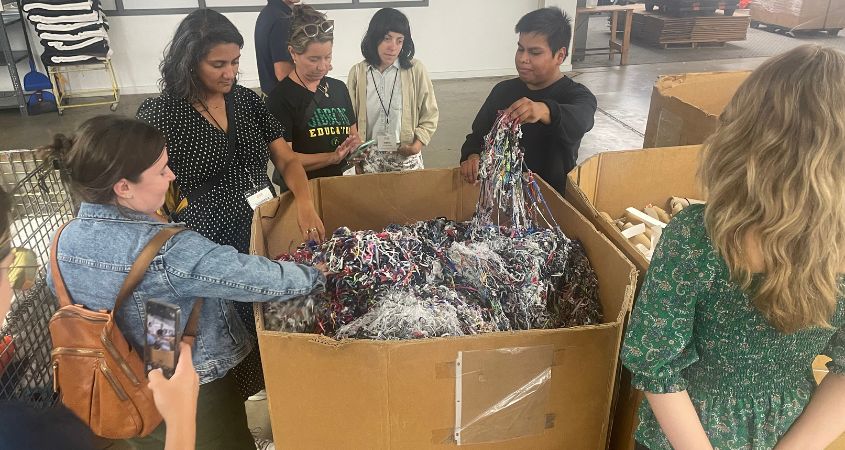
Participants look at a collection of fabric scraps that will be taken to Material Return, to be made into a new yarn to make beanies and socks!
Throughout the immersion, participants had the opportunity to tour facilities and learn about the key partners in the ethical clothing manufacturing community. They began at Carolina Textile District, a member-governed and member-driven network of values-aligned textile manufacturers in North and South Carolina. Participants then toured Opportunity Threads, a worker-owned cooperative cut-sew factory primarily operated by migrants from Guatemala who now own and operate the facility within the cooperative model.
The next tour was with Material Return, which works with local manufacturers and national brands to transform textile waste into new products. Material Return models a circular economy, which is an economic system based on the reuse and regeneration of materials or products, especially as a means of continuing production in a sustainable way. At Material Return, fabrics and threads that would have gone to waste are instead used to create new products such as beanies and socks. This model of circularity benefits the environment, local economies, workers, and values-aligned clients.
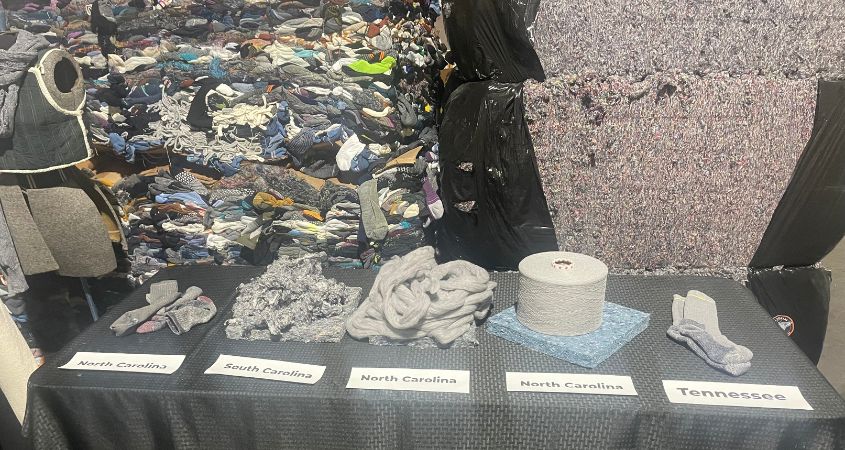
A demonstration of how Material Return takes old socks to create new socks. Each step of this process is also done as locally as possible to reduce carbon emissions.
After a full day of facility tours at The Industrial Commons in Morganton, participants traveled to Burlington, North Carolina, to a partner of the Carolina Textile District, TS Designs, a t-shirt manufacturing business focused on local sourcing, low carbon emissions, and corporate responsibility. Using the triple-bottom-line business model, which focuses on three equally important bottom lines: People, the Planet, and Profits, Eric Henry, founder and president of TS Designs, has crafted a t-shirt with full transparency from the growing of the cotton to the dyeing and printing process. He and his organization know who made it and the effect it has had on the planet in each step of the process.
Apparel made from this transparent, ethical production process is already having an impact at CEPA-partnered schools. While at TS Designs, participants were looking through a box of t-shirts, and Sarah Richard, student engagement coordinator at the Hanley Sustainability Institute at University of Dayton, found a copy of the exact t-shirt she was wearing, which was made for her university by TS Designs.
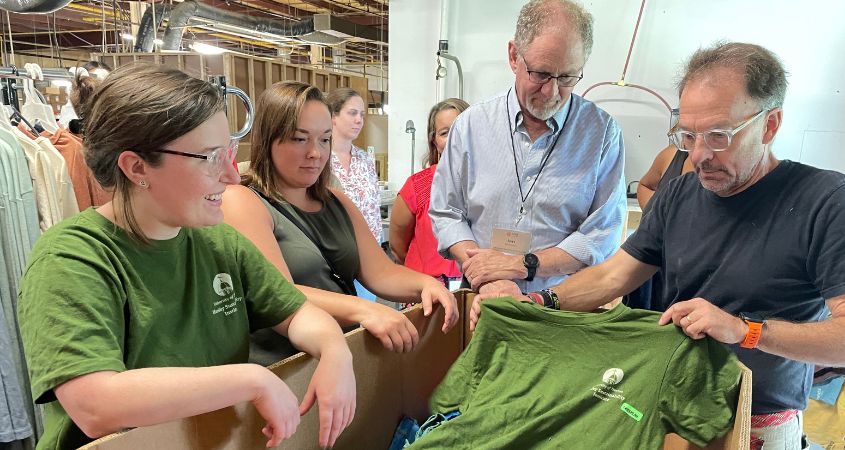
Sarah Richard, student engagement coordinator at the Hanley Sustainability Institute at University of Dayton, finds a copy of the t-shirt she is wearing, which was made for her university by TS Designs.
The immersion presented an opportunity for leaders in ethical purchasing and Catholic institutions to gather and learn more about the work of creating clothing and the ways in which individuals and institutions can make purchasing choices that align with protecting the rights and dignity of workers and the planet.
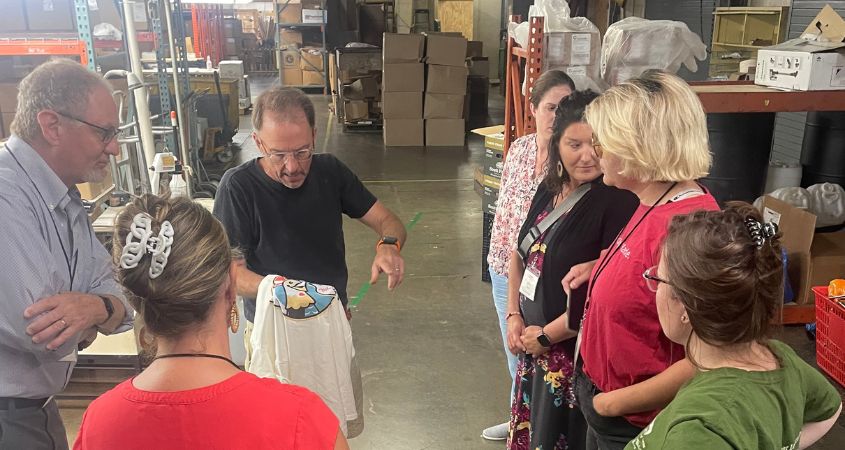
Participants meet with Eric Henry, president of TS Designs, and tour his screen printing and dyeing facility for t-shirts! Henry has worked to implement sustainable methods to print and dye t-shirts. He is also working to create a North Carolina t-shirt, where every step of the t-shirt manufacturing process is done in-state.
When asked about the impact of the immersion overall, Richard reflected, “I really enjoyed the opportunity to see firsthand an example of what’s possible. In the classroom, we often talk about the issues in our supply chain and while we present the theory of change, to be able to meet the people waking up and doing this work every day, is quite inspiring.”
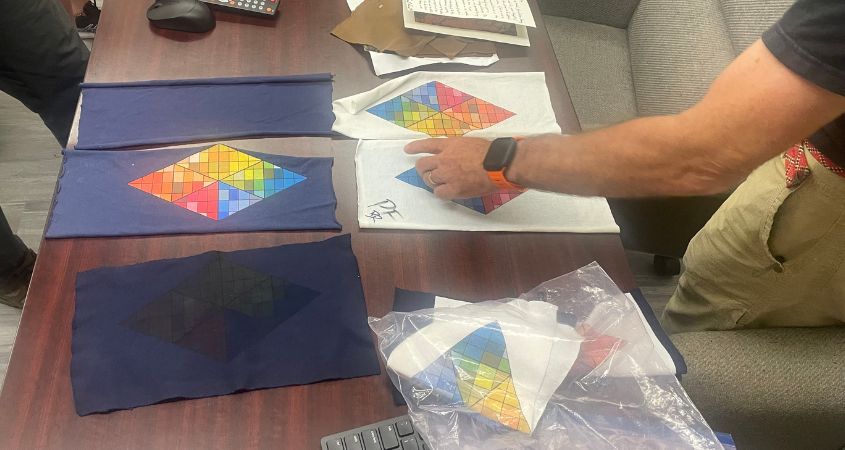
Henry shares with participants the continued effort TS Designs is taking to create an even more sustainable and efficient dyeing and printing process.
“The mini-immersion provided an opportunity for leaders in various institutions to come together and find ways to create a path for a more ethical purchasing model in their institutions,” said Grace Adams, Catholic Ethical Purchasing Alliance coordinator. “We were lucky to have representatives from Catholic high schools, the University of Dayton—our first CEPA university—, and leaders within this work at the Garment Workers Center and the Sweatfree Purchasing Consortium present to learn about ways our institutions can honor the dignity of workers and the earth through purchasing policies and decisions.”

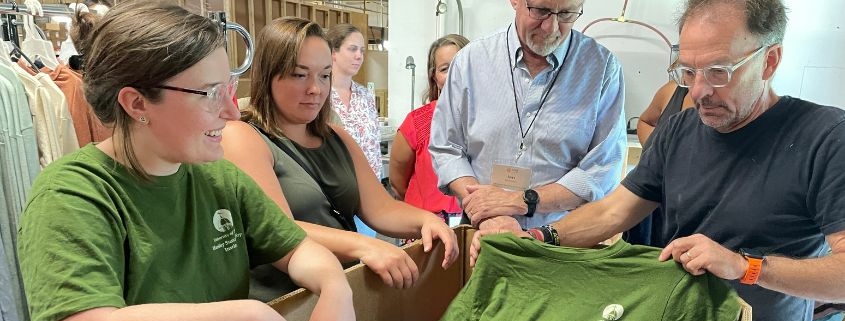
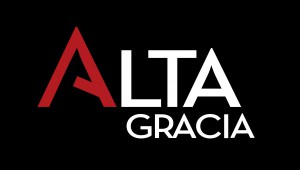
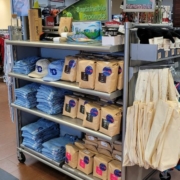



Immersion exercises are eye-openers. Young minds are thirsting for ethical training. They all want to make the right choices that honor Planet Earth and enhance the dignity of workers and their families.